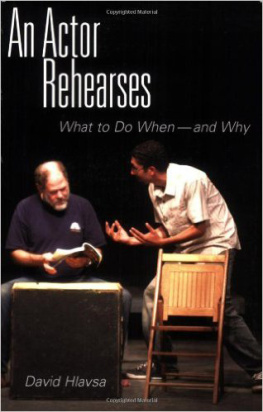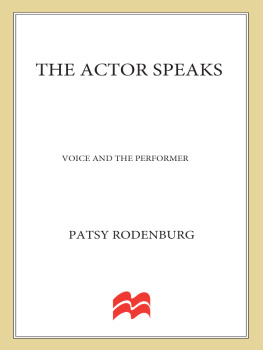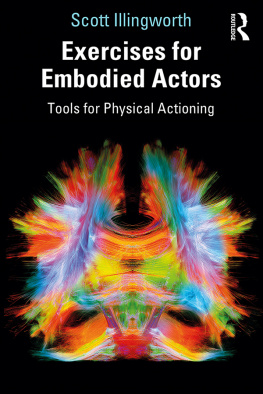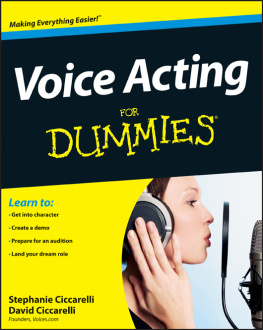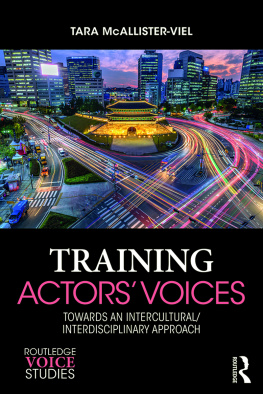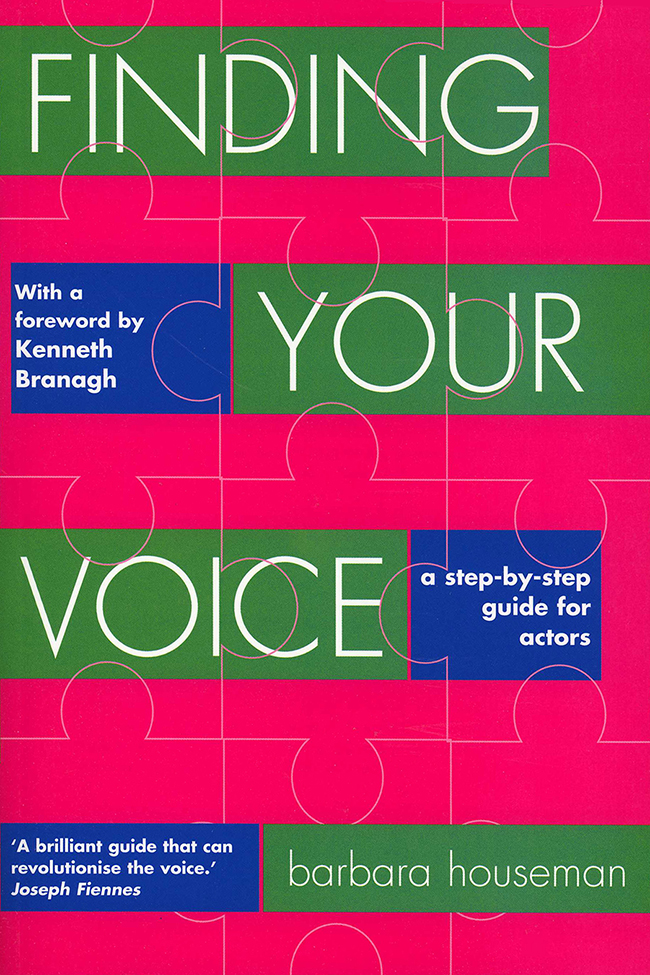Contents
To Mark Bauwens
without whose inspiration, patience, and support this book would never have been written
Foreword
I first became aware of Barbara Housemans work some years ago when I was performing with the Royal Shakespeare Company. She was part of the great tradition of voice teaching, which the company encouraged, pioneered by the brilliant Cis Berry.
More recently I have worked with Barbara as a director and as an actor. In both cases she was an enormous inspiration.
This excellent book distils the experience of many years into a tremendously useful manual. Not just for the actor, but for anyone who wishes to work on releasing the full potential of their voice and reap the benefits in their life and work.
The books advice is practical and flexible. Application is certainly required to see results, but enjoyment of the process is also remembered throughout. The work really is fun. It can be read sequentially or dipped into according to need or specific interest.
My experience is that these techniques and this philosophy result in clearer, more truthful communication, in individuals expressing themselves with greater meaning and truth, and help people, through the joyful release of their vocal potential, to become more fully themselves.
For that gift I thank Barbara, and I wish you joy on the journey.
KENNETH BRANAGH
Acknowledgements
Over the years I have been fortunate to have worked with many gifted and inspirational people. I am grateful to them all; especially to Katya Benjamin, Meribeth Bunch, Mark Meylan, Veronica Smithers, Andrew Wade, Sue Weston and Tessa Van Sertima and the directors and actors at the Royal Shakespeare Company, but four people need a special mention.
Firstly, Rita Melene, whom my mother found when I was five years old. Rita taught me for many years, before I went to the Central School of Speech and Drama at nineteen. She had trained at Central in the 1920s, when Elsie Fogerty, the founder, was still Principal. She taught me to love words; she introduced me to Shakespeare before anyone had suggested it might be difficult, so I was never frightened of it.
When I auditioned for the teaching course at Central, she gave me a list of about seventy-five books a mixture of plays, poetry and theatre theory to wade through. She told me I needed to read them all or I would not stand a chance of getting in. So, I dutifully made my way through the entire list. Of course, they never asked me about a single book, but I did not regret having read them.
The next person, to whom I owe so much, is Sonia Moriceau, with whom I studied Shiatsu and Meditation. Her work has influenced mine profoundly. Through her I have discovered much about the link between mental and physical energy and this has proven invaluable both in my own work and in that with actors. I continue to work with her and shall do so as long as she continues to teach.
The third person is Janice Chapman, a superb singing teacher, whom I first met just over ten years ago, when I attended one of her workshops. Right from the start I realised how valuable and exceptionally clear her work on support was. For a time I was able to work with her privately and the majority of the support work I now do is based on her excellent work and research.
The last, but certainly not least, person is Cicely Berry, whom I was very fortunate to be able to work with in my six years at the Royal Shakespeare Company. Cicely has revolutionised the way we work on voice and text, not just in this country but also world wide, and most voice teachers working today have been influenced by her work; whether they know it or not! Watching her at work and working with her was invaluable and she has had a huge influence on my work, especially in terms of text.
Of course, there is one last group of people that I need to thank and that is everyone that I have taught, for indeed it has been their questions, needs and difficulties that have taught me so much.
THANKS TO
Mark Bauwens, Lyle Jobling and Mark Meylan for painstakingly reading various drafts and giving such excellent feedback. Thanks also to Mark Meylan and John Rubin for their contributions to the Vocal Health section and to Meribeth Bunch for checking many of the anatomical details. Thanks to Nicola Endicott for watching me draw endless stick men and patiently trying to teach me about perspective! Finally, thanks to Caroline Downing for such detailed and understanding editing. I could not have wished for a better editor.
Introduction
The potential of voice work
Voice work can release an actor. The voice is the bridge between the inner and outer worlds and, if the voice is free, it can reflect the inner world with great accuracy, revealing each actors unique response to character, situation and text.
That is the purpose of this book: to support each actor to find their own released voice; to find their own power and expression so they can fully communicate their thoughts and feelings subtly, flexibly and excitingly.
So how does this book work?
This book is about choices, not about correctness. Depending on your experience of voice work you can use it in different ways to build up your own personal tool kit to serve your individual needs as an actor.
If you have done little or no voice work, read through each chapter once quite lightly, so that you get an overview. Then, go back and work through the exercises in that chapter. Once you are comfortable move onto the next chapter and work in the same way. At the end of each chapter I suggest how you can put the exercises together to create a brief workout, so that you are not stuck with an ever-increasing session. Once you have gone through the whole book you will have a much greater understanding of your voice and of which exercises help you most. Then, you can put together your own workout and warm-up or you can use the ones I suggest.
If you have done more voice work, but feel there are gaps you would like to fill in, then, read lightly through the introduction to each chapter to get an overview of the work and then pick and choose the exercises you think will be most helpful.
If you have a particular issue that you want to work on, then, look in the trouble-shooter section. This will give you a brief explanation and direct you to relevant exercises.
Respecting the complexity of the voice
We need to work on the voice with respect. The voice is an expression of self. It expresses our ease or lack of ease both with ourselves and the world. It cannot be bullied into shape.
To work on your voice you need to start by getting to know it: approaching it with curiosity and respect rather than judgement and demand. Then you will start to understand your voice and any necessary change will be much easier and more pleasurable to achieve.
Where not to look for your voice!
Our voices naturally have the potential to express our inner thoughts and feelings so powerfully and accurately yet often this potential becomes obscured. This can lead us to believe that we never had the potential in the first place. As a result we may try to copy someone else, whom we feel does have a powerful and expressive voice. This never works. Such a voice can never reveal our inner responses. If you wish to find a voice that truly touches an audience, you have to find your own voice.
Understanding why we lose connection with our voice
Before you can find your own voice it is necessary to understand how its potential to express and reveal so powerfully and accurately is obscured.
When we are very young our voices are strong, free and connected. The reason for this is that we trust ourselves. We have a clear connection with how we feel and we have the freedom and confidence to express this with-out doubt, judgement or effort.



